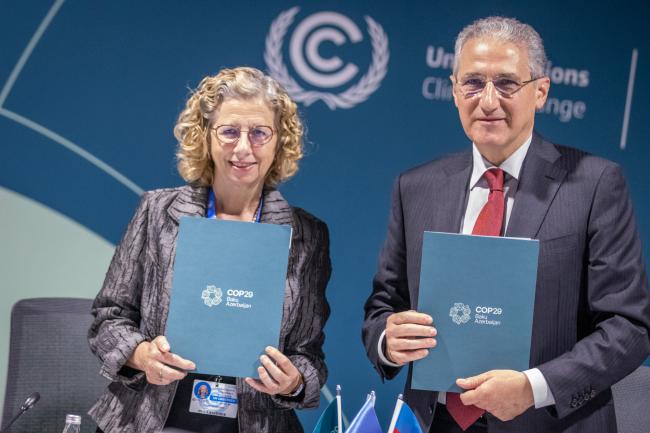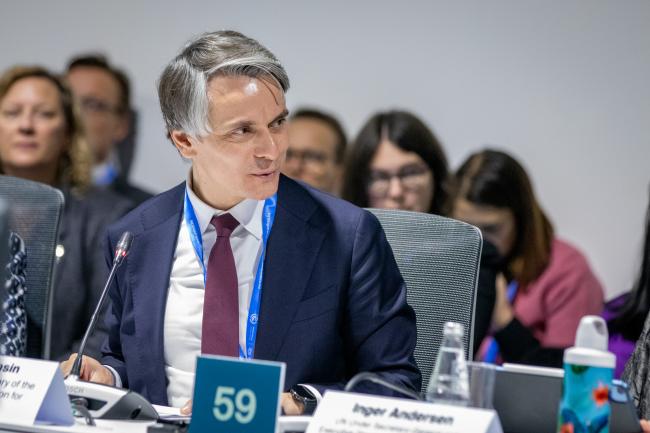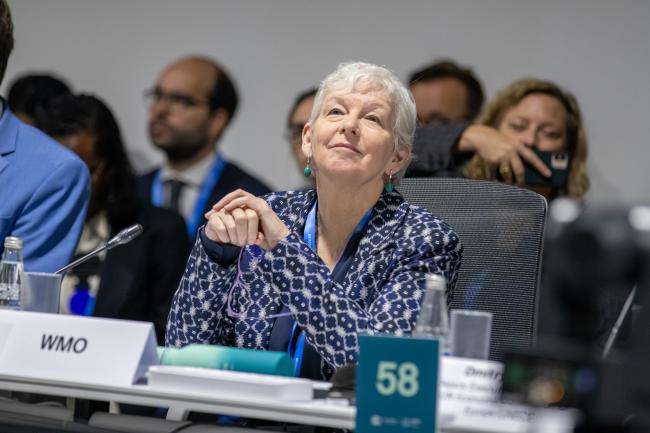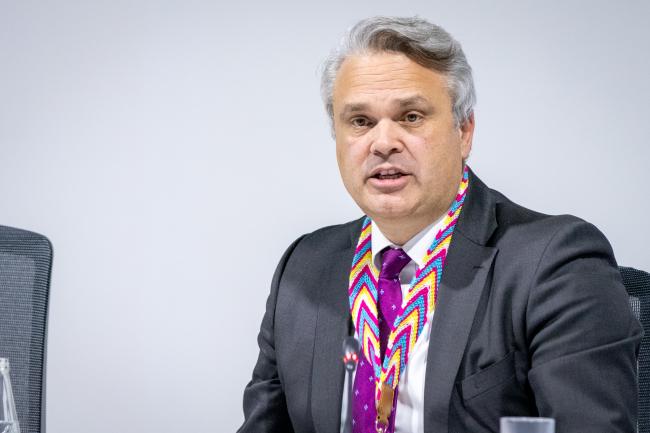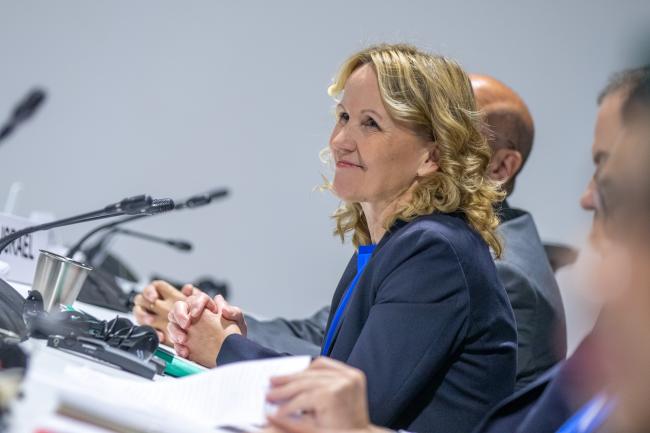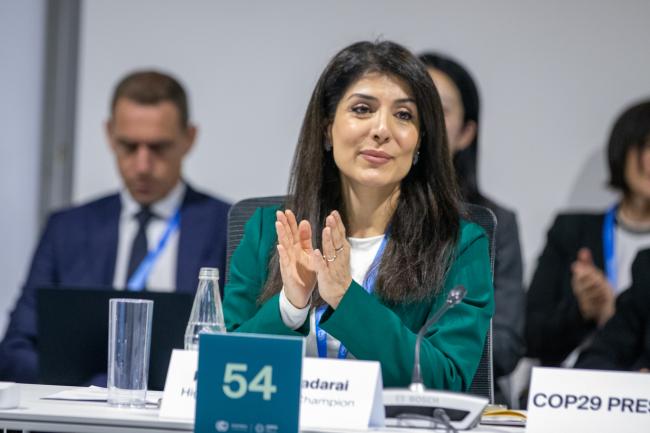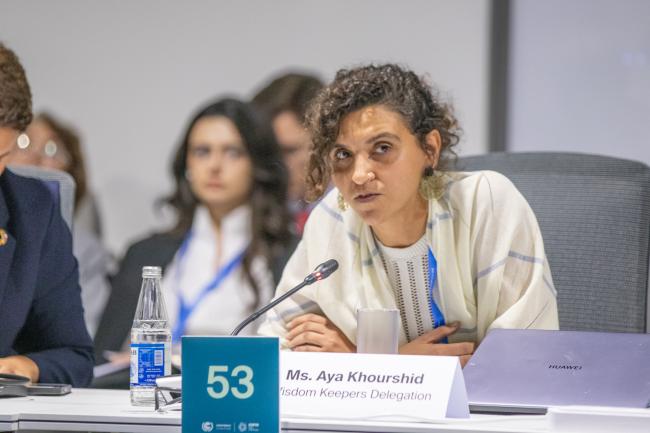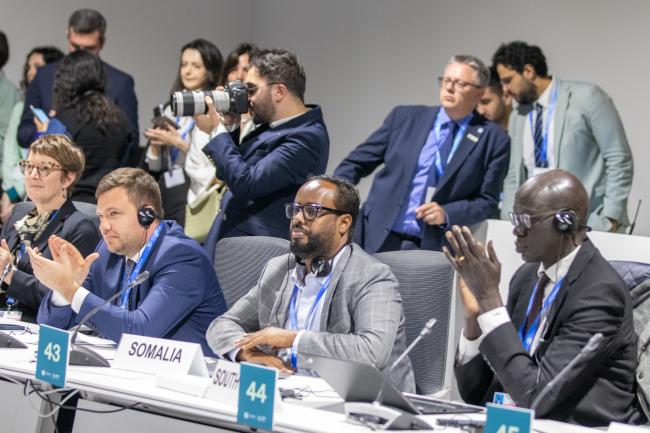About
Water became a priority at COP 29 with the endorsement of the COP 29 Declaration on Water and Climate Action and launch of the Baku Dialogue on Water for Climate Action. In this event, governments shared how they integrate water in their climate strategies, working towards a better future for all.
In a milestone moment, COP 29 saw the launch of the Baku Dialogue on Water for Climate Action (Baku Dialogue), a platform that promotes collaboration and initiatives that accelerate solutions for the water crisis. At a high-level where the Baku Dialogue was launched, leaders discussed ways to work together on water to inspire climate action. Johannes Cullman, Scientific Advisor to the President of the 77th session of the UN General Assembly (UNGA), acted as moderator.
In highlighting the importance of water as part of climate action, Mukhtar Babayev, COP 29 President, opened the high-level event by lauding the endorsement of the COP 29 Declaration on Water and Climate Action (Baku Declaration) and the historic Baku Dialogue to foster global partnerships addressing water challenges. He encouraged everyone to support the Baku Dialogue to ensure voices are “amplified” from COP to COP.
Inger Andersen, Executive Director, UN Environment Programme (UNEP), welcomed the Baku Dialogue as the first step to addressing water in the context of the triple planetary crisis. After sharing the dire impact of devastating floods and water scarcity, she urged everyone to focus on water as part of their climate agendas, from making a “rapid shift in thinking” on urban infrastructure and water resource management to aligning policies and action plans with institutional investments.
The event featured the signing of Letter of Intent for the Baku Dialogue on Water for Climate Action by Babayev and Andersen.
Dmitry Mariyasin, Deputy Executive Secretary, UN Economic Commission for Europe (UNECE), stressed the need to prioritize water in climate negotiations and to recognize that it lies in the “complex nexus between food security, energy access, and health.” He emphasized the importance of transboundary water cooperation and developing practical guidance on how to mainstream transboundary water in Nationally Determined Contributions (NDCs) and National Adaptation Plans (NAPs), as cooperation is the “pathway to water resilience and facilitating climate action on the ground.”
In a video message, Retno Marsudi, UN Special Envoy on Water, hoped that the Baku Dialogue would be: conducted consistently to ensure progress on the “water-climate nexus”; inclusive of all stakeholders; and generate concrete benefits to people through initiatives and the follow-through of commitments.
Ko Barrett, Deputy Secretary-General, World Meteorological Organization (WMO), shared the large scale of challenges faced by countries in addressing water resilience, particularly with respect to freshwater, as outlined in WMO report State of Global Water Resources 2023. WMO, she added, is committed to leveraging its expertise to support informed decision-making and help countries develop early warning systems and innovative response measures to water-related hazards.
As an introduction to the roundtable on the Baku Dialogue, Rocky Dawuni, UNEP Goodwill Ambassador for Africa, in a video, stressed that “water balance is tipping in the wrong direction.” He urged for: the government and private sector to act with more urgency; countries to integrate water and its ecosystem services into national policies; and Member States to include the water agenda across all climate COPs.
Steffi Lemke, Federal Minister for the Environment, Nature Conservation, Nuclear Safety and Consumer Protection, Germany, emphasized that “water is the messenger of the climate crisis” noting that the impact of climate change is mostly felt through water. She commended the Baku Dialogue for enabling discussions and implementation to “go hand in hand” with the work of the new UN Special Envoy for Water.
Mary Creagh, Department for Environment, Food and Rural Affairs, UK, shared ways the UK prioritized water in its climate agenda, which includes launching the Just Transition for Water Security Programme to provide technical assistance to vulnerable countries so they can better manage water resources.
As part of the work of the US on integrating water in climate strategies, Laura Daniel-Davis, Acting Deputy Secretary, Department of the Interior, US, noted that the US launched its 2022-2027 Global Water Strategy, which operationalizes the White House Global Water Security Action Plan.
Anthony Agotha, Special Envoy for Climate and Environment Diplomacy, EU, stressed the importance of the Baku Dialogue in bringing water “higher in the global agenda.” He noted the vital role of water ecosystems and urged governments, academia, and the private sector to work together to ensure basic human rights are met when including water as part of climate action.
Kai Mykkänen, Minister of Climate and the Environment, Finland, called on countries to: enhance capacity to address “climate change-induced disasters”; share data to improve forecasting events; coordinate disaster risk response for transboundary waters; and develop early warning systems.
Sergiu Lazarencu, Minister of Environment, Moldova, emphasized that international cooperation on water resource management—including transboundary cooperation—is key to ensuring sustainable water resources.
Bojan Kumer, Minister of the Environment, Climate and Energy, Slovenia, noted Slovenia’s active participation and support of transboundary efforts, including in regional and global initiatives.
Abdulla Balalaa, Assistant Minister of Foreign Affairs for Energy and Sustainability, United Arab Emirates (UAE), shared the UAE’s initiatives in tackling water scarcity. He cited the example of the XPRIZE Water Scarcity competition, which has a total prize purse of USD 119 million, to encourage innovators around the world to transform water desalination technology.
Nathaniel Lewis-George, Environment and Climate Change Canada, discussed the launch of the Canada Water Agency and its investment of CAD 650 million over 10 years in the Freshwater Action Plan to support community-based projects designed to protect freshwater sources.
Malang Darboe, Deputy Permanent Secretary, Ministry of Fisheries and Water Resources, The Gambia, emphasized the importance of addressing the nexus between water and climate change and the critical role of international collaboration in strengthening transboundary water management.
Meike van Ginneken, Water Envoy, the Netherlands, lauded the Baku Declaration as a milestone, putting water “at the heart of the UNFCCC process.”
A representative for Belgium recognized that access to water is one of the most important issues of today, citing the danger to harvests and water scarcity, and emphasized the importance of raising awareness and mobilizing efforts to achieve climate action.
Amir Givati, Director-General, Israeli Meteorological Service, stated the importance of integrated water methodology, citing Israel’s work on reusing water and the use of innovative irrigation technology.
Alessandro Guerri, Director General, Ministry of Environment and Energy Security, Italy, shared the launch of the G7 Water Coalition, which seeks to strengthen the “political relevance of water” internationally, improve water resource management, and contribute to the Sustainable Development Goals (SDGs).
Shinichi Goto, Ministry of Land, Infrastructure, Transport and Tourism, Japan, extended sympathy to countries recently affected by typhoons around the world. He urged the inclusion of water in climate action and commended the launch of the Baku Dialogue and endorsement of Baku Declaration.
In the second segment, an intimate “Lakeside chat” with women leaders, moderator Shams Mustafayeva, World Bank Gender Consultant, asked panelists what gives them hope for the future.
Nigar Arpadarai, UN Climate Change High-Level Champion for COP 29, stated that people give her hope because of the efforts she has seen to make the Baku Declaration and Baku Dialogue come to fruition at COP 29.
Aya Khourshid, Wisdom Keepers Delegation, emphasized the importance of listening to Indigenous Peoples’ voices as their traditional knowledge can work in synergy with advanced technology to protect, conserve, and manage water resources.
Kamala Huseynli-Abishova, Water for Climate Action focal point, COP 29 Presidency, stated that the future generation gives her hope as it reminds her of the need to preserve water and pass it on to the next generation.
In the third discussion, Mustafayeva invited partners to share their thoughts on what it takes to scale up and accelerate mitigation and adaptation through action on water.
Mamman Nuhu, Executive Secretary, Lake Chad Basin Commission, stressed the need to “bridge the gap between science and policy” and foster collaboration and action. With the Baku Dialogue, he hoped initiatives would be scaled up to make them inclusive and practical for communities who are most affected.
Recognizing the value of water in all activities, Dani Gaillard-Picher, Swedish Water House, stated that water and hydrologic cycles should be “echoed” throughout the COP and in spaces related to agriculture, food, and health.
Gary White, Chief Executive Officer and Co-Founder, Water.org and WaterEquity, lamented the lack of financing to achieve water sanitation, pointing to an overstretched public budget and stagnation of multilateral and bilateral financial support. He cited his company’s work in leveraging USD 6 billion in micro loans, to whom 80% are women, exemplifying innovations in financing solutions.
Henk Ovink, Executive Director, Global Commission on the Economics of Water, noted the key to managing water is to “embrace water and the hydrologic cycle” fully. With the launch of the Baku Dialogue, which fosters partnerships and water initiatives, he stated that water now “has a home.”
Helen Rumford, WaterAid UK, hopes to see the Baku Dialogue focus on: peoples’ needs to safeguard their food source and lives; the finance required to deliver on goals; and real action on addressing water access and security.
Vidhisha Samarasekara, International Water Management Institute (IWMI), encouraged countries to place water at the center of policies and finance. Emphasizing the importance of science and data to guide decision-making, she shared her hope that this can create the impact needed for a water secure world.
In closing the event, Jala Ibrahimova, Co-Lead, Action Agenda Team for COP 29, thanked UNECE, UNEP and WMO for supporting the COP 29 Presidency in developing the Baku Dialogue and reminded the audience that “water is at the heart of climate change” and invited more countries to be part of the Baku Dialogue, calling it a “powerful movement” to ensure water benefits all.
Organizer: COP 29 Presidency, UNECE, WMO, and UNEP
Contact: Dianna Kopansky | dianna.kopansky@un.org
Website: https://www.unep.org/
To receive free coverage of global environmental events delivered to your inbox, subscribe to the ENB Update newsletter.
All ENB photos are free to use with attribution. For this side event, please use: Photo by IISD/ENB | Matthew TenBruggencate
Selected Images

Mary Creagh, Parliamentary Under-Secretary of State and Minister for Nature, Department for Environment, Food and Rural Affairs, UK

Ko Barrett, Deputy Secretary-General, WMO, Inger Andersen, Executive Director, UNEP, Mukhtar Babayev, COP 29 President and Dmitry Mariyasin, Deputy Executive Secretary, UNECE

Kamala Huseynli-Abishova, Water for Climate Action focal point, COP 29 Presidency, Alpar Abishov, and Johannes Cullman, Scientific Advisor to the President of the 77th session of the UN General Assembly

Kamala Huseynli-Abishova, Water for Climate Action focal point, COP 29 Presidency, and Alpar Abishov

Inger Andersen, Executive Director, UNEP; Aysel Rzayeva, Action Agenda Team expert, COP 29 Presidency; Kamala Huseynli-Abishova, Water for Climate Action focal point, COP 29 Presidency; and Mukhtar Babayev, COP 29 President

Moderator Johannes Cullman, Scientific Advisor to the President of the 77th session of the UN General Assembly
